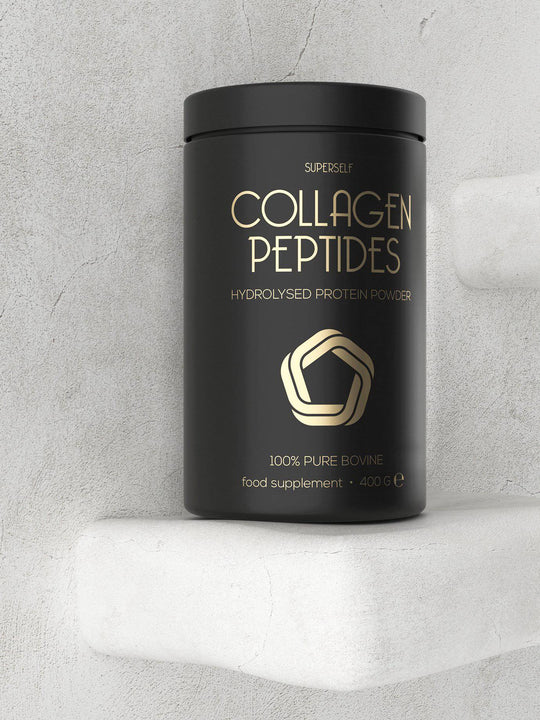The darling of the cosmetic industry, collagen is a protein plentiful in the human body. It has been one of the most popular ingredients in skincare products for a long time due to its reported benefits for skin, hair, and nails.
If you are reading this, chances are you have reached for a tub of collagen powder or were eyeing that bottle of liquid collagen in the local supermarket yourself. However, with great popularity comes great confusion. There are a number of myths circulating about collagen, and it can be tricky to discern what is true and what is not.
Today we’re going to bust seven of the most common myths about collagen, some of which may come as a massive surprise to you.
1. Collagen creams work.
Sorry to be the bearer of the bad news, but applying collagen topically won’t result in more hydrated, youthful, or dewy skin. The reason is because the collagen molecules are too large to penetrate the skin barrier. This goes for both premium creams and serums, and low-priced products. No matter how much you spend on collagen-enriched skincare products, its molecules will simply sit on the skin surface without actually being absorbed by the skin.
2. Our bodies have collagen, so there is no need for supplements.
While this is partially true, collagen is the most abundant protein in the human body, so reaching for a high-quality supplement may lead to several benefits, with no adverse effects. In addition to boosting the health of skin, hair, and nails, some of these benefits are alleviating joint pain, promoting cardiovascular, gut, and improving brain health, as well as speeding up the metabolism. A high-standard supplement may be a wise choice, given that collagen production decreases with age.
Another reason to consider taking a collagen supplement is that, although it’s a protein abundant in animal-sourced foods, most people’s diets are too nutrient-poor.
Efficient collagen production relies on vitamin C, zinc, and copper in sufficient quantities.
3. Collagen is only suitable for skin and joint health.
Though it seems that collagen enjoys stardom in the cosmetic industry because of its health-promoting benefits when it comes to hair, skin, nails, and joints, it plays a crucial role in many other processes.
Did you know that collagen can help improve sleep? Glycine, an essential building block of collagen, has been linked to helping patients suffering from sleep disorders fall asleep faster and sleep longer.
Another vital area in which collagen plays a prominent role is in each phase of wound healing. Collagen dressings are a standard aid in treating wounds, as they speed up the recovery and help promote the new collagen being made.
4. You don’t need to worry about collagen until you are in your 40s.
It’s a common misconception that collagen decline is something we don't need to worry about until we’re in our 40s, when the wrinkles and lines become more pronounced. However, collagen production will start declining while we are in our 20s. After we turn 20, our bodies produce 1% of collagen less in the skin each subsequent year.
So, staying proactive when it comes to skin health is vital. Perhaps you have heard of the term “collagen banking,” which simply means that we should boost collagen synthesis in our bodies while in our 20s and 30s so we have more of it in later years when our bodies start showing the signs of aging.
5. You will see benefits right away.
Many become disappointed when they fail to notice any significant changes after starting to take a collagen supplement. This is, however, perfectly normal, as the body suddenly sends available collagen to the places that need it the most.
A study published in the Journal of Cosmetic Dermatology has shown that when it comes to the skin health and appearance-related benefits, it takes roughly four weeks to see minor changes for the better and up to 12 weeks to experience significant improvements.
6. Vegan collagen boosters are just as effective as marine or bovine collagen.
As we mentioned earlier, collagen is a naturally occurring protein found not only in the human body but throughout the animal kingdom and marine life. That being said, it is NOT naturally found in plants. However, with the rise of the plant-based movement across the globe, vegan collagen peptide builders have become more available.
While these cruelty-free alternatives are admirable, they should be regarded as what they say they are: collagen builders or substances that help our body to produce more collagen, but not the actual collagen.
7. All collagen supplements are created equal.
Shopping for a good collagen supplement might seem like a daunting task. Should you go for an animal-sourced one or opt for a plant-based alternative? What do Type I, Type II, and Type III mean? And how exactly is hydrolysed collagen different from a regular one?
Firstly, let’s start with collagen types. While there are at least 16 different collagen types, the three most common types are:
Type I: Made of dense fibres, it structurally supports skin, bones, teeth, connective tissue, etc., and 90% of the total amount of collagen in the body is Type I.
Type II: This is a part of joint cartilage and is commonly used as a supplement for joint cartilage support.
Type III: Found in hollow organs like the bowels and uterus, this type plays a prominent role in wound healing.
Hydrolysed collagen is simply a more processed variety, made especially for easier and faster absorption.
We talked about the difference between animal-sourced and plant-based collagen earlier. The decision on which type to purchase is, ultimately, yours. When choosing the right collagen supplement for you, it’s essential to look at the collagen source. Superior ingredients with high bioavailability deliver faster and more noticeable results.
In addition, taking vitamin C with your collagen, or opting for a collagen-vitamin C combo, is desirable, as vitamin C boosts the body’s natural collagen synthesis.
The bottom line
Collagen plays many vital roles in the human body. Because of its hair, skin, and nail strengthening properties, it has been used extensively in the cosmetic industry. But with a wide array of collagen products becoming increasingly available, it is easy to become overwhelmed with information.
Given how our bodies produce less collagen as we age, make sure to get it by eating animal-sourced foods, or alternatively, through a collagen supplement.
Collagen Peptides Powder - 400 G

£24.90
Made from natural bovine collagen, this SuperSelf powder provides an easy collagen supplement. Simply add to a smoothie, glass of water or other drink. Highly digestible collagen powder 400g per tub (40 days supply) Little taste or smell About collagen… Read More
Find more SuperSelf reviews here.


